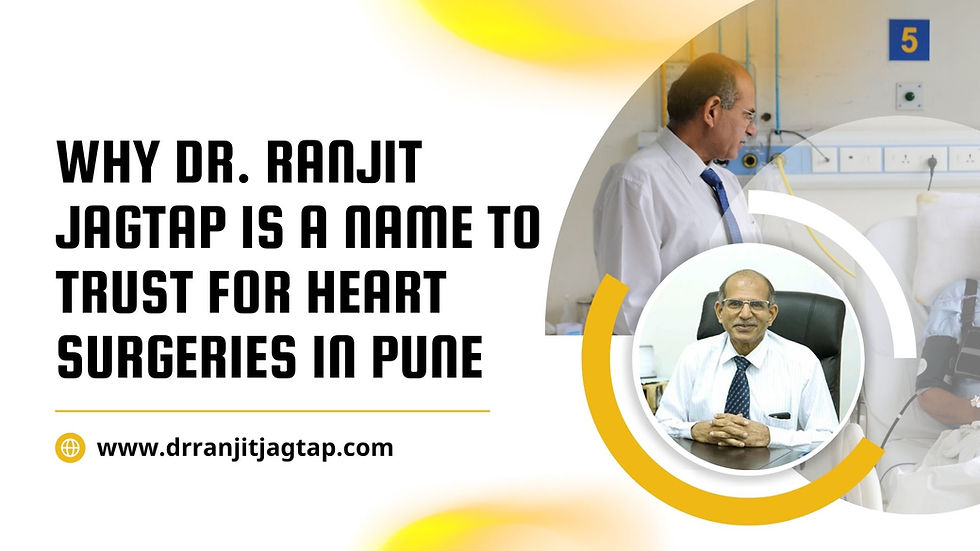A Heart's Culinary Dilemma - Dr Ranjit Jagtap
- drranjitjagdap
- Sep 26, 2023
- 3 min read

In the bustling world of modern living, the heart often finds itself at a culinary crossroads. The choices we make at the dinner table can profoundly impact the health of our most vital organ. Renowned cardiovascular specialist, Dr. Ranjit Jagtap, is a steadfast advocate for the profound connection between dietary choices and heart health. In collaboration with his daughter, Aditi Jagtap, a healthcare professional, they embark on a journey to unveil the top foods that cardiologists unanimously advise against for the sake of your heart.
1. Sugary Sweets and Beverages: A Sweet Heart Risk
Indulging in sugary sweets and beverages may seem harmless, but they can have a profound impact on heart health. Dr. Ranjit Jagtap news explains how excessive sugar consumption can lead to weight gain, high blood pressure, and diabetes, all of which are detrimental to heart health. His clinic places a strong emphasis on reducing added sugars in your diet, opting for natural sweeteners like honey or fresh fruits when the need for sweetness arises.
2. Processed and Red Meats: A Recipe for Heart Troubles
Processed and red meats are frequently found on cardiologists’ lists of foods to avoid. They are often high in saturated fats and cholesterol, which can clog arteries and increase the risk of heart disease. Dr. Jagtap’s clinic advocates for lean protein sources like poultry, fish, and plant-based options to support heart health. This shift can significantly reduce your risk of heart-related issues.
3. Trans Fats: The Sneaky Heart Saboteurs
Trans fats, often lurking in fried and processed foods, are notorious for raising bad cholesterol levels and lowering good cholesterol. Dr. Ranjit Jagtap and Aditi Jagtap concur that these sneaky heart saboteurs should be eliminated from your diet whenever possible. Reading food labels and choosing products with zero trans fats is a simple yet effective step toward better heart health.
4. Excessive Sodium: The Silent Culprit
Excessive sodium intake is a silent culprit behind high blood pressure, a significant risk factor for heart disease. He advises limiting salt intake and opting for herbs and spices to flavor your meals instead. By reducing sodium consumption, you can maintain healthy blood pressure and support your heart’s well-being.
5. Refined Grains: The Refinement You Can Do Without
Refined grains, found in white bread, pasta, and many processed foods, lack the nutrients and fiber present in whole grains. Dr. Ranjit Jagtap suggests that replacing refined grains with whole grains like brown rice, quinoa, and whole wheat products can improve heart health by reducing cholesterol levels and stabilizing blood sugar.
6. Excessive Alcohol: A Double-Edged Sword
While moderate alcohol consumption may have some heart benefits, excessive drinking can lead to heart problems, including high blood pressure and heart failure. He encourages responsible drinking, if at all, and emphasizes that it’s essential to stay within recommended limits.
Conclusion: Navigating a Heart-Healthy Culinary Odyssey
Maintaining a heart-healthy diet is not a journey with a final destination; rather, it’s an ongoing odyssey, a culinary adventure filled with mindful choices and nutritious alternatives. Dr. Ranjit Jagtap’s Clinic, who has dedicated his career to the well-being of countless hearts, and his daughter, Aditi Jagtap, reinforce the critical importance of avoiding these detrimental foods for the sake of your heart.
In a world where tempting culinary delights often collide with the desire for a healthier heart, it’s essential to remember that every choice matters. By making informed decisions at each meal, you are not only pleasing your palate but also safeguarding your most vital organ — the heart, the rhythmic center of life.
Let your culinary choices resonate with the wisdom of Dr. Jagtap and Aditi Jagtap, echoing through the chambers of your heart as a symphony of health. With each wholesome bite and every conscious selection, you are crafting a heart-healthy future for yourself, a future filled with vitality and well-being.



Comments